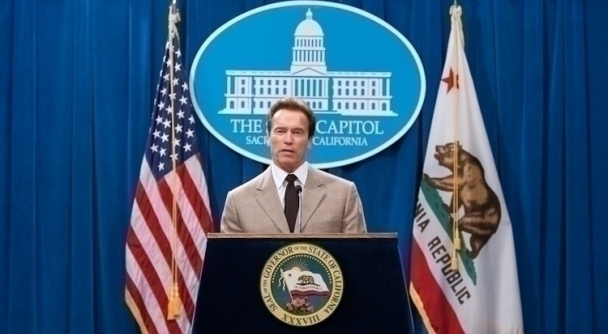Fighting for Our Economy

April 19, 2004 Governor Schwarzenegger reformed workers’ compensation, which has saved employers more than $70 billion to date and reduced rates by nearly 65 percent. In 2006, Governor Schwarzenegger vetoed legislation that would have undermined the bipartisan workers’ compensation reforms passed by the legislature in 2004.
April 13, 2005 The Governor addressed California’s critical nursing shortage by launching the California Nurse Education Initiative. This five-point plan, which focused on a $90 million public-private partnership to provide funding for nurse education, led to a 68 percent increase in RN graduates.
March 29, 2006 The Governor signed Executive Order S-02-06 to achieve the goal of awarding 25 percent of state contracts to small businesses. Since the EO was issued, the state has consistently passed the 25 percent goal.
April 22, 2006 The Governor established the Honor a Hero, Hire a Veteran partnership to help veterans and their families transition into civilian life. In May 2008, the Governor directed the California Labor and Workforce Development Agency to award $2 million to job training programs for veterans.
September 12, 2006 Governor Schwarzenegger signed AB 1835, raising California’s minimum wage to $8 per hour. AB 1835 employed a phased-in approach, which
increased the minimum wage from $6.75 to $7.50 on January 1, 2007, and then by another 50 cents on January 1, 2008.
November 28, 2006 By executive order, Governor Schwarzenegger took action to bolster economic development in California’s Central Valley by reauthorizing the California Partnership for the San Joaquin Valley.
November 2006 Voters approved the Governor’s Strategic Growth Plan, a $42 billion investment in California’s roads, schools, levees, and housing. The SGP is the single largest investment in California’s infrastructure in more than fifty years.
December 26, 2007 The Governor proposed a plan to bring approximately 20,000 new engineers into California’s workforce over the next decade by expanding existing educational programs and building new partnerships between our schools, the military, and the private sector.
January 30, 2008 The Governor announced more than $72 million in federal HOME investment partnership program funds to help first-time home buyers, reduce the number of bank-owned homes, and increase the number of rental properties.
February 2008 As part of a series of actions to help families hurt by the economic downturn, the Governor met with industry leaders to expedite the release of infrastructure bond money and jump-started $69.5 million in low-interest loans from Proposition 1C, helping more than 1,000 families stay in their homes.
February 29, 2008 Governor Schwarzenegger directed $10.5 million to train workers displaced by the housing downturn, specifically residential construction workers.
April 18, 2008 The administration directed $2.5 million in job training grants to regions hit hardest by the economic downturn.
December 12, 2008 Governor Schwarzenegger launched the Bank on California initiative to encourage Californians without bank accounts to sign up for them, thus creating greater financial security and protecting Californians from the exorbitant fees charged by check-cashing businesses. This program is the first of its kind at the state level in the country.
April 17, 2009 The Governor took action to speed up services and benefits for the unemployed by hiring 1,150 additional people to staff call centers and cut down on wait times.
March 24, 2010 Governor Schwarzenegger signed into law the Green Technology Manufacturing Equipment Sales Tax Exemption, which provides incentive for clean energy companies to come to, or stay in, California. This exemption is part of the Governor’s California Jobs Initiative, a legislative package that will create or retain at least 100,000 jobs.
April 8, 2010 By executive order, Governor Schwarzenegger started the Governor’s Office of Economic Development, a one-stop shop to help businesses acquire the direction, information, and resources they need to invest, succeed, and expand in California. Much of GoED’s work has focused on the green economy, in response to the fundamental market shift that resulted from the Global Warming Solutions Act, signed by Governor Schwarzenegger in September 2006.
• GoED has been working with a number of green companies and initiatives to help grow the green industry.
• GoED has been involved with Sacramento Mayor Kevin Johnson’s Greenwise initiative at the local level and is working on other events to highlight the green industry’s role in the region.
• To help ensure the success of solar, bio, and renewable energy companies, GoED has worked with them to provide assistance and access to resources.
• GoED has teamed up with the Environmental Defense Fund Team to map California’s green economy.
July 30, 2010 Governor Schwarzenegger announced that the film tax credit had allocated $200 million to 77 projects in its first year, achieving its goal of keeping scores of film and TV projects in-state and protecting thousands of California jobs. In 2009 the Governor had signed the film tax credit as part of a targeted economic stimulus package to increase film and television production in California.
Green Venture Capital Under Governor Schwarzenegger, California has led the nation in clean-tech venture capital investment ($9 billion from 2005 to 2009, accounting for 60 percent of the total in North America) and direct job creation from clean-tech venture capital investment.
Clean-Tech Companies Seven of the largest ten clean-tech companies are based in California, and according to a study by Pew Charitable Trusts, California has more clean-energy businesses (10,209) than any other state.
Indian Gaming Governor Schwarzenegger and his administration worked diligently over the past seven years to strengthen tribal gaming compacts in California. As a result of these efforts, general fund revenues from compacts jumped $372 million since 2004—from $19 million in fiscal year 2004–2005 to $391 million in fiscal year 2009–2010. Total revenues from the compacts increased from $128 million in 2002–2003 to $462 million in 2008–2009. Every compact drives job growth and provides protections for communities in which gaming takes place, including provisions to safeguard the environment, patrons, workers, and employees.
